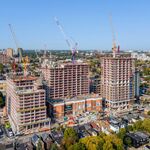TheKingEast
Senior Member
If foreign ownership has such a small impact on real estate prices, why have home prices in B.C. substantively decreased since the implementation of the foreign buyers tax?
http://www.theglobeandmail.com/real...s-market-continues-to-soften/article33878876/
I think there's some confusion about what is being proposed. This isn't a tax on immigrants. We're talking about imposing a %15 tax on buyers who are not Canadian citizens. They are living in other countries and buying Canadian property. Middle class Canadians cannot compete with wealthy foreign investors who have no intention of living in the homes they are buying, but can turn a profit flipping them in a market seeing %20 year over year price increases. Failure to impose such a tax is a failure of governance and makes housing less affordable for Canadians.
Actually, prices were on the way down before the tax. It's silly to take what's happening in Vancouver and apply it here. This is an issue with many different factors and in some ways Toronto is similar to Vancouver and other ways it isn't.
That tax will not make housing affordable in Toronto. It will not make the transit problem go away, nor will it improve the lack of affordable rental housing in the city. Won't even address the lack of supply either.
There's only so much intervention the market can tage before it crashes. Just don't complain when it happens. That's a general comment.




